|
Dear neighbors:
We’ve reached another inflection point in the legislative session, transitioning from the passage of separate budget bills by the House and Senate to the convening of conference committees to negotiate differences and try to reach agreement. Below is more background on this process and on the details of many of these budget bills. There’ll be a great chance to discuss this further this weekend – see just below.
Join Our Town Hall on Sunday
Rep. Her, Sen. Murphy, and I are eager to hear your questions and feedback as we head into the final two weeks of negotiations with our Republican colleagues. With that goal in mind, we are holding a virtual town hall for constituents this Sunday, May 2 from 4:00pm to 5:30pm. If you’d like to join us, please register at https://forms.gle/zrQM5nx7FKKdi4je6. You will receive a Zoom link before the event begins.
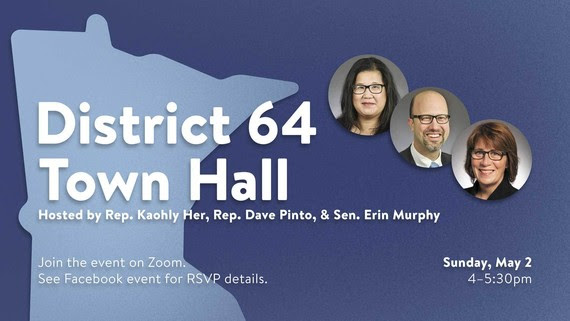
State Budget Update
On Monday at close to midnight, we finished passing our budget bills – comprehensive plans for each area of the budget. Together, these bills reflect our vision for the future and the feedback we’ve heard from Minnesotans.
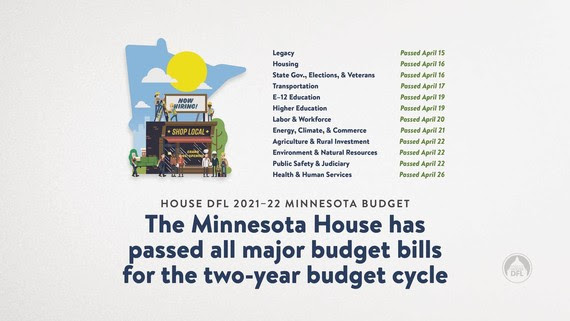
The next step in this process is forming “conference committees.” Legislators from the House and the Senate are appointed to these bipartisan committees, which have already started meeting. Their goal is to find compromise and develop a bill that can be sent back to each chamber for a final vote. I expect to be appointed to the Health and Human Services conference committee but will keep in close touch with colleagues on all of these committees. Throughout this process, I will continue advocating for policies that allow every Minnesotan to thrive.
Public Safety Budget: Reform and Accountability
In my last legislative update, I addressed the then-recent killing of Daunte Wright. Several days later came the verdict in the trial of Derek Chauvin for the murder of George Floyd. While I’m relieved that there will be individual accountability in that case, the need for deep and systemic change continues.
As a member of the House committee with jurisdiction in this area, I’ve been working closely with my colleagues of color on a number of criminal, legal, and police reforms. The budget bill that we passed last week included a number of meaningful changes. You can find a list of these changes here, but these are some of the highlights:
- Authorize local governments to establish civilian oversight councils
- Prohibit white supremacists from becoming police officers
- Limit officers’ authority to stop or detain drivers for certain issues
- Limit the use of no-knock warrants
- Invest in body cameras and prohibit altering, destroying, or withholding the footage
- Strengthen the police officer misconduct database and build a more effective early warning system to identify problem officers and keep them off the streets
- Support community organizations working to prevent crime
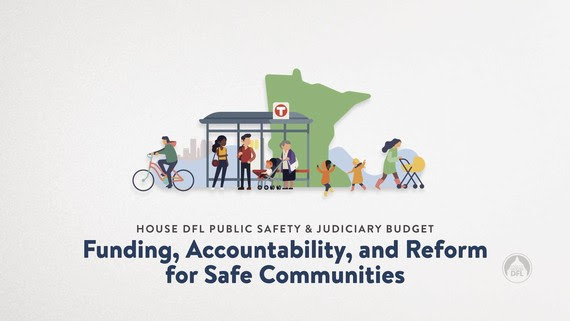
The budget bill incorporates important proposals in other areas as well. One highlight is my juvenile justice reform bill (discussed in a previous update and in this recent piece in the Star Tribune), which would prohibit the use of strip searches and solitary confinement on young people and prevent children as young as 10 from being sent through the delinquency system.
The budget bill would also strengthen Minnesota’s laws against sexual assault. It incorporates two proposals that I authored to aid in the fight against human trafficking – a particular focus in my work outside of the Legislature as a prosecutor. And it would reform the criminal sexual conduct laws per recommendations from a working group led by survivors, including closing the “voluntary intoxication” loophole that prevents survivors from receiving justice. (These latter proposals were discussed more in a prior legislative update.)
Climate and Energy Budget: Addressing the Climate Crisis
As one of the fastest warming states in the country, Minnesota is already experiencing the impacts of climate change. We’ve seen multiple extreme weather events, and some communities - primarily those of color - are already facing heightened rates of asthma and other health issues. Our Climate and Energy budget bill is an ambitious plan to address this crisis. It puts Minnesota on a path to achieve 100 percent clean energy by 2040 and eliminate all carbon emissions by 2050. Transitioning to a clean energy economy would create good-paying jobs, affordable energy, and new industries. This bill ensures that all Minnesotans, especially those most impacted by climate change, can access these benefits.
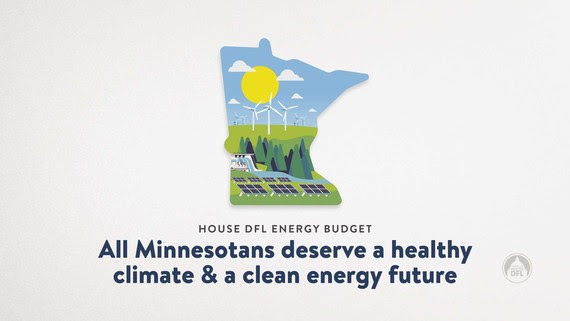
Health and Human Services Budget: Support for Every Minnesotan to Thrive
Late Monday, we approved a Health and Human Services (HHS) budget that makes investments and policy changes that will allow every Minnesotan to thrive. Particularly exciting to me is the budget’s focus on young children and their families, with significant proposals drawn from the Early Childhood committee which I chair. The bill would greatly expand support for prenatal care and maternal health, including extending health coverage for low-income mothers to 12 months following a birth. It would invest more in voluntary home visiting and in broader economic supports for low-income families. Using a combination of state and federal funds, the budget would invest more than $200 million in early learning and care for these families, as well as more than $300 million in monthly stabilization payments for this critical sector, with a focus on individual teachers and caregivers (who currently receive poverty-level wages).
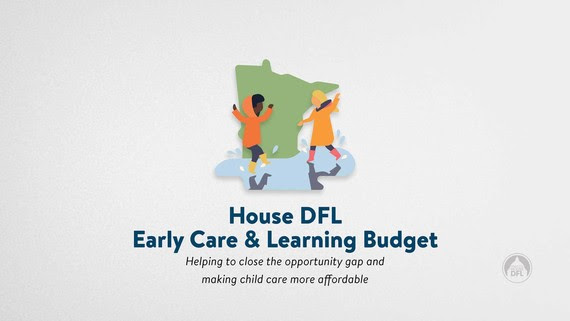
Every person in our state deserves access to affordable, high-quality healthcare. The HHS budget would expand healthcare coverage and pave the way for a public option. It would also codify important Affordable Care Act provisions – like those that protect people with preexisting conditions – into state law and make prescription drugs more affordable.
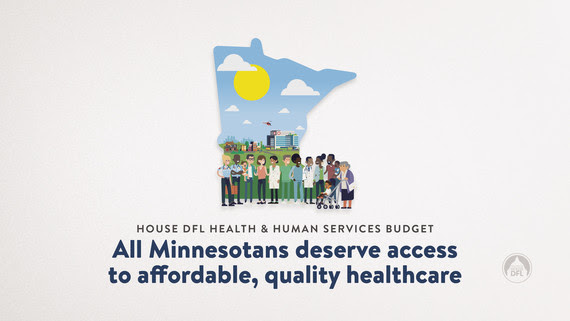
Housing Budget: Making Home Safe and Affordable
The Housing omnibus bill helps ensure that all Minnesotans have a safe and affordable place to call home. While housing stability is always critical, it’s particularly important during a pandemic. Our budget proposal helps more than half a million Minnesotans who currently don’t have access to secure housing. It expands the supply of affordable housing, connects more people with homeownership opportunities, and helps increase homeownership among communities of color. Other policies prohibit practices that harm renters and disproportionately impact BIPOC households.
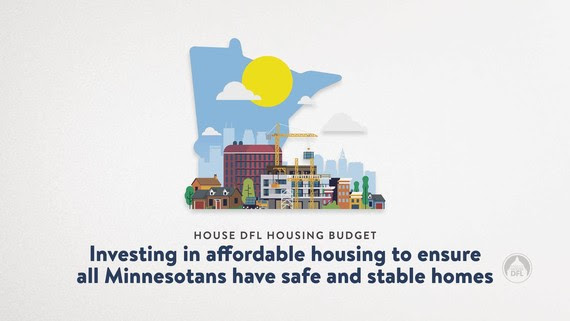
E-12 and Higher Education Budgets: Investing in Minnesota Students
Students of all ages have had a difficult year. Our E-12 and Higher Education omnibus bills would help them recover and prepare for the bright future that they deserve. The E-12 Education budget invests in every child in every public school, including strong support for our youngest learners. Provisions from the Early Childhood committee that I chair would preserve 4,000 pre-kindergarten slots that were set to expire and provide nearly $40 million for early learning scholarships. These investments in the youngest Minnesotans would help close our state’s persistent opportunity gap. Several additional provisions, such as the Increase Teachers of Color and American Indian Teachers Act, aim to address racial disparities in the classroom.
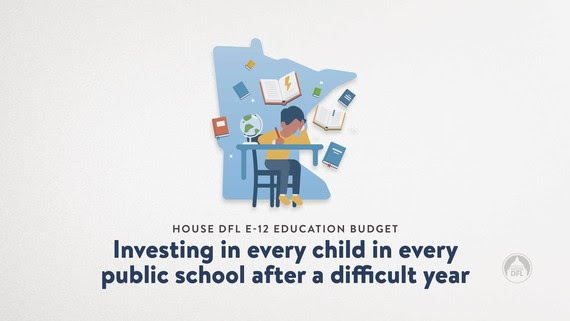
The Higher Education budget also contains several strong investments. It holds tuition flat at Minnesota State campuses, expands the state grant program – of particular importance for St. Kate’s, Macalester, and St. Thomas in our neighborhood – , increases funding for mental health resources and food insecurity, expands the ranks of career and technical education instructors in high schools, and more.
Environment and Natural Resources Budget: Protecting Our Air, Water, and Land
Last Thursday, on Earth Day, we passed the Environment and Natural Resources budget, a robust plan to protect Minnesota’s air, water, land, and wildlife for current and future generations. This proposal delivers funding to manage significant threats like climate change, pollution, and invasive species; strengthens environmental protections; expands access to the outdoors and outdoor recreation, with a focus on children and young adults; protects animals and insects, including pollinators; and addresses racial and economic disparities that put communities of color, Indigenous communities, and low-income communities at a higher risk for exposure to pollution and hazardous chemicals.
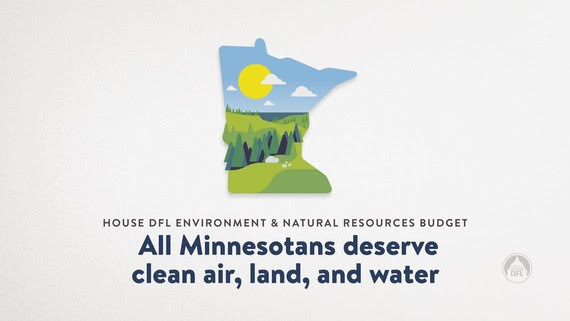
Tax Budget: Prioritizing Those Hit Hardest by COVID-19
While many Minnesotans are struggling due to the pandemic and its economic consequences, COVID-19 hasn’t impacted everyone equally. The Tax bill that we approved last Thursday supports those who were hit hardest, including working families, students, seniors, and small businesses. It puts our state in a position to make ongoing investments in education, healthcare, and economic security by asking the wealthiest Minnesotans – people making more than $500,000 – to pay their fair share. This would make our tax system fairer, as would providing tax cuts and aid to workers receiving unemployment benefits, small businesses impacted by the pandemic, and businesses who received PPP loans. It also increases Homestead Credit and Renters Property Tax Refunds for more than one million qualified households. Together, these provisions will help Minnesotans recover from COVID-19 and thrive once it’s behind us.

There is a lot going on! Please keep in touch. You can like my Facebook page to stay up to date, and encourage family, friends, and neighbors to sign up for these emails as well. Thank you for the honor of serving you at such an important time.
Dave Pinto
State Representative, District 64B
503 State Office Building
(651) 296-4199
www.house.leg.state.mn.us/64b
Subscribe to my email updates: www.house.leg.state.mn.us/64b
Follow my office on Facebook: facebook.com/repdavepinto
|